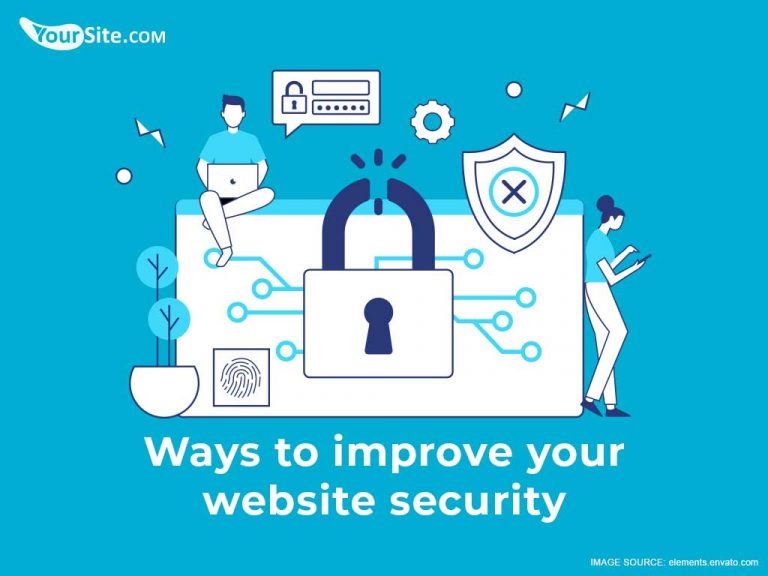In the old days, only massive websites used to get hacked. So, if you had a new website, you could add post after post without ever worrying about things like data leaks and malware injection. Nowadays, hackers aren’t quite as discriminating. Even your new, fresh-faced, tiny little website could get caught up in a mass hacking.
So, after you finish creating your web site, how do you keep it secure without having it cost an arm and a leg?
Here’s how:
Table of Contents
6 ways to protect your web site
1. Choose your web site host carefully
Even if your site security measures would be the envy of government agencies everywhere, your hard work will be in vain if you don’t choose the right hosting provider. That’s because your web host is your first line of defence against hackers. If your web host doesn’t keep its servers secure, there’s pretty much nothing you can do to stave off a cyberattack.
That’s why you can never be too careful when you’re choosing a web host. Take your time and look for a web host with good reviews, helpful customer service, and secure servers. How do you know when you’ve found a good host?
Good web hosts will have features like these:
- Website backups
- 99% uptime
- 24/7 customer service
- Advanced SEO tools
- Well-maintained servers
2. Use strong passwords
If your web host is your first line of defence against hackers, then your password is your second. If you want your web site to be secure, you have to choose a password that’s borderline unguessable. That means no birthdays, no pets’ names (even if you write them backwards), no anniversaries, and for the love of all that is good, no consecutive numbers like “1234”.
The best passwords are random or seemingly random. A good way to create a nearly unguessable password is to think of a sentence that only makes sense to you, then convert that sentence into letters and symbols. For instance, “I had my first blueberry pie at 23 years old!” could become “I#mFbP@23yO!”
To make your passwords even stronger, you can beef them up by changing them regularly and by storing them in an encrypted form. If you want a faster way, consider using a password generator tool.
3. Switch to HTTPS
HTTPS stands for HyperText Transfer Protocol Secure, and as its name suggests, it’s the more secure version of HTTP, which transfers data between your web site and a web server.
To switch from HTTP to HTTPS, you’ll need to install an SSL certificate, which encrypts data that passes between your web site and web servers. An SSL is an important security feature for any website, but if your web site handles credit card transactions, an SSL certificate is mandatory.
Not only do SSL certificates improve the security of your web site, but they also improve your site’s ranking in search engines. Powerful search engines like Google will rank secure websites higher than websites that are still using HTTP. Considering a cheap SSL certificate? Learn if they’re worth a try here.
4. Streamline your web site design
Every single element on your website is a possible point of entry for hackers and cybercriminals. The second your web security goes out of date; a hacker can exploit its vulnerabilities and get to your sensitive data. That’s why it’s important not to have more databases, apps and plugins than you can safely keep track of. Streamlining your web site will make it much easier to make sure all your features are functional and up to date. Using a secure site builder template is a great alternative to WordPress sites.
Speaking of which…
5. Keep your web site up to date
It’s kind of a pain to keep track of all those updates, but if you don’t make sure that every single bit of software on your website is current, you run the risk of being caught up in mass attacks that target the vulnerabilities of unpatched, out-of-date software.
6. Back up your data
Your last line of defence against hackers is an excellent backup system. Keep at least two backups of all your website files. This way, you won’t be stuck staring blankly at your screen if your data ever gets lost by accident or through malicious attacks. Take advantage of plugins that are designed to back up your website, and ensure that you back up your website as often as you add new content to it.
Wrapping up
If you want to protect all the hard work that went into creating your website, you’ll need to keep it secure. But that doesn’t mean you have to spend buckets of money on security tools. If you follow these six tips, you can secure your web site without taking a hammer to your piggybank.
If you enjoyed these tips on keeping your website secure, check out our guide on how to grow your web site by verifying your site with Google search console!






